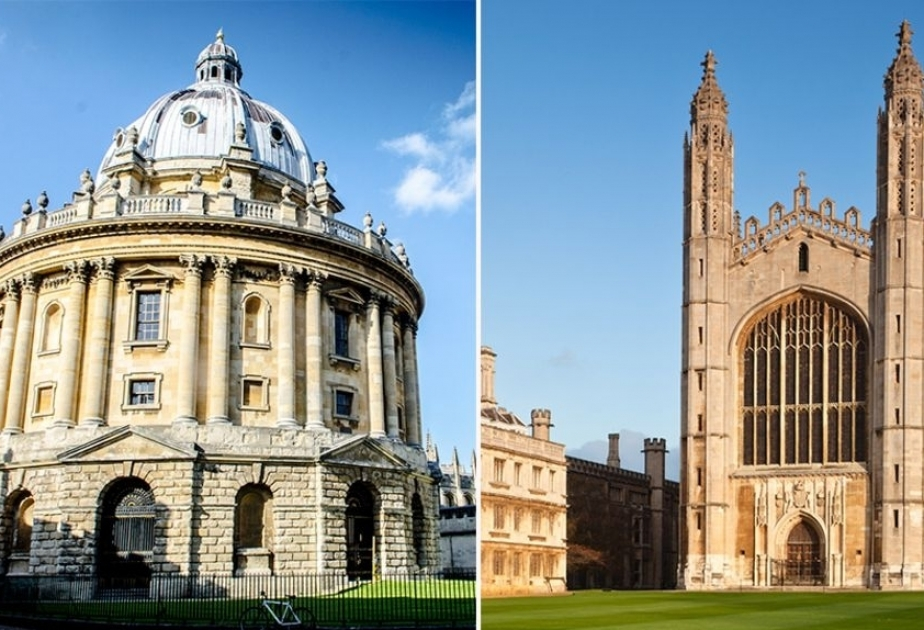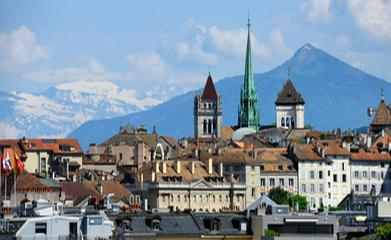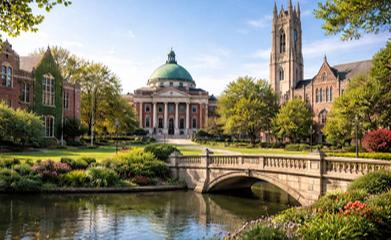

Oxford vs. Cambridge: Which University Has Produced More Nobel Laureates and World Leaders?
Oxford and Cambridge — the UK’s two leading universities and among the best in the world — have been rivals for over eight centuries in the quest to be recognized as the country’s most prestigious institution. However, this rivalry is largely symbolic. Both universities consistently rank at the top of global league tables and are considered benchmarks in education. Interest in applying to Oxbridge shows no signs of declining.
That’s why trying to determine which one is “better” doesn’t make much sense, in our view.
Still, at ED-EX.com, we were curious to find out which of the two universities has been the alma mater to more remarkable individuals — Nobel Prize winners and political leaders. We’re sure you’ll be surprised by some of what we found!
Oxford
Let’s start chronologically, by seniority. Although Oxford’s exact founding date is unknown, most sources agree that the university began admitting students in 1096. It is the second-oldest university in the world (by the way, here’s the first) and the oldest in the English-speaking world.
As of October 2022, Oxford counts 73 Nobel Prize winners among its alumni and affiliates. Here are a few notable names:
Robert Robinson (Nobel Prize in Chemistry, 1947)
A British organic chemist, Robinson was a professor and research fellow at Magdalen College, teaching chemistry at Oxford. He received the Nobel Prize in Chemistry for his research on alkaloids — natural compounds used to produce many pharmaceuticals. His work had a profound impact on organic chemistry and pharmaceutical science.
Dorothy Hodgkin (Nobel Prize in Chemistry, 1964)
An outstanding British chemist, Dorothy Hodgkin spent most of her academic career at Oxford. She taught at Somerville College and later held a professorship, focusing on the structure of complex organic compounds. In 1964, she became the first and only British woman to receive the Nobel Prize in Chemistry, awarded for her use of X-ray crystallography to determine the structures of vital substances like penicillin and vitamin B12.
Amartya Sen (Nobel Prize in Economic Sciences, 1998)
An Indian economist and philosopher, Sen studied and taught at Oxford — at Nuffield and All Souls Colleges. His research lies at the intersection of economics, ethics, and social justice. His ideas significantly shaped the ways we assess quality of life and human development. He was awarded the Nobel Prize for his work in welfare economics, particularly on social choice theory and the causes of poverty and famine.
John Goodenough (Nobel Prize in Chemistry, 2019)
An American physicist and solid-state chemist, Goodenough led the Inorganic Chemistry Laboratory at Oxford and was a fellow of St Catherine’s College. In 2019, he received the Nobel Prize in Chemistry for his crucial role in the development of lithium-ion batteries — a technology that underpins modern portable electronics and electric vehicles. At 97, he became the oldest laureate in the history of the Nobel Prize.
Roger Penrose (Nobel Prize in Physics, 2020)
A renowned British theoretical physicist and mathematician, Penrose taught at Oxford for many years and, since 1999, has held the university’s chair in mathematics. He was awarded the Nobel Prize in Physics for demonstrating that the formation of black holes is a direct consequence of general relativity. His work laid the foundation for modern cosmology and our understanding of the universe.
In addition to its Nobel laureates, Oxford is associated with four Fields Medal winners and six recipients of the Turing Award.
Here’s another impressive fact: 31 British Prime Ministers studied at Oxford! Among them:
- David Cameron — Prime Minister of the UK (2010–2016), studied Philosophy, Politics and Economics (PPE) at Brasenose College.
- Tony Blair — Prime Minister (1997–2007), studied law at St John’s College from 1972 to 1975.
- Margaret Thatcher — the first woman to become UK Prime Minister (1979–1990), studied chemistry at Somerville College.
- Boris Johnson — Prime Minister (2019–2022), studied Classics (Ancient Greek and Latin) at Balliol College.
- Clement Attlee, Harold Macmillan, Edward Heath, Stanley Baldwin, and many more.
Other influential political figures who studied at Oxford include:
- Bill Clinton — President of the United States (1993–2001). He studied at University College as a Rhodes Scholar, focusing on philosophy, politics, and economics (PPE).
- Indira Gandhi — Prime Minister of India (1966–1977, 1980–1984). She studied at Somerville College.
- Manmohan Singh — Prime Minister of India (2004–2014), studied at the Blavatnik School of Government, Oxford.
- Benazir Bhutto — the first woman to serve as Prime Minister of Pakistan (1988–1990, 1993–1996). She earned a PPE degree and served as President of the Oxford Union.
- Viktor Orbán — current Prime Minister of Hungary, completed a research fellowship at Oxford.
- Lester Pearson — Prime Minister of Canada (and Nobel Peace Prize laureate), also studied at Oxford.
Oxford alumni are known not only for their academic achievements and political leadership but also for their excellence in sports: collectively, they have earned 160 Olympic medals.
Cambridge
The second-oldest university in Britain after Oxford, the University of Cambridge (founded in 1209) holds the national record for the most Nobel Prize winners. A total of 125 individuals affiliated with Cambridge have received Nobel Prizes for their outstanding contributions to science and culture — an all-time high.
Among the university’s most important and celebrated achievements are the discovery of the structure of DNA and penicillin.
Here are some world-renowned Nobel laureates who studied or worked at Cambridge:
Alexander Fleming (Nobel Prize in Physiology or Medicine, 1945)
A British microbiologist who earned his doctorate at Cambridge. He is best known for discovering penicillin — the world’s first antibiotic, which has saved millions of lives.
Bertrand Russell (Nobel Prize in Literature, 1950)
A philosopher, logician, and writer — one of the most influential thinkers of the 20th century. He received the Nobel Prize for his contributions to humanitarian ideals and his book A History of Western Philosophy (1946). He studied at Trinity College, Cambridge, becoming the university’s first Nobel laureate in literature.
Frederick Sanger (Nobel Prize in Chemistry, 1958 and 1980)
An exceptional English biochemist. A graduate of St John’s College and a fellow at King’s College. Remarkably, he received the Nobel Prize in Chemistry twice: first for determining the structure of insulin, and later for developing the Sanger method for DNA sequencing. He was the first of only five scientists in history to be awarded the Nobel twice.
Francis Crick (Nobel Prize in Physiology or Medicine, 1962)
A British molecular biologist, biophysicist, and neuroscientist. Alongside James Watson, he discovered the double-helix structure of DNA. Crick worked at the Cavendish Laboratory in Cambridge — this discovery laid the foundation of modern molecular biology.
Max Perutz (Nobel Prize in Chemistry, 1962)
A British biochemist of Austrian origin. He revealed the structure of hemoglobin using X-ray crystallography and was a founding figure of the Laboratory of Molecular Biology in Cambridge.
Dorothy Hodgkin (Nobel Prize in Chemistry, 1964)
An English chemist and biochemist. The first woman from Cambridge to win a Nobel Prize and one of just five female chemistry laureates in the award's history. She was recognized for her pioneering work in determining the structures of biologically active substances using X-rays.
Richard Stone (Nobel Prize in Economic Sciences, 1984)
An English economist and Cambridge graduate, who later chaired the university’s Department of Applied Economics. He was awarded the Nobel for his innovative work in developing systems of national accounts, which became a global standard.
Venkatraman Ramakrishnan (Nobel Prize in Chemistry, 2009)
An Indian-born biochemist awarded for uncovering the structure and function of the ribosome — a key molecular machine in cells. Since 1999, he has worked at the Laboratory of Molecular Biology at Cambridge.
John Gurdon (Nobel Prize in Physiology or Medicine, 2012)
A British biologist who showed that mature cells can be reprogrammed to become pluripotent — a breakthrough that laid the groundwork for cloning and regenerative medicine. He worked at the Cambridge Laboratory of Molecular Biology from 1971 to 1983.
Gregory Winter (Nobel Prize in Chemistry, 2018)
A British biochemist and biotech pioneer, professor at Cambridge University. Recognized for his work on phage display of antibodies — a revolutionary technique for developing therapeutic antibodies to treat diseases, including cancer.
Didier Queloz (Nobel Prize in Physics, 2019)
Awarded for the first discovery of an exoplanet orbiting a sun-like star — a milestone that launched a new era in astronomy.
Roger Penrose (Nobel Prize in Physics, 2020)
A British physicist and mathematician, PhD from Cambridge. He studied mathematics at St John’s College and now leads the mathematics department at Oxford. Penrose provided mathematical proof that black hole formation is a direct consequence of general relativity — a foundation of modern cosmology.
Demis Hassabis and John Jumper (Nobel Prize in Chemistry, 2024)
These contemporary British researchers — both Cambridge alumni — were awarded the Nobel Prize in Chemistry for developing AlphaFold2, an artificial intelligence capable of predicting the complex structures of proteins. Their system accurately mapped nearly all of the 200 million known proteins — solving a challenge that had remained unsolved for over 50 years.
In addition to its Nobel Prize winners, Cambridge is proud of many equally distinguished graduates. Among them:
Isaac Newton (1643–1727)
One of the greatest scientists in history. Founder of classical mechanics, author of the laws of motion and universal gravitation. Independently developed calculus (alongside Leibniz). His Mathematical Principles of Natural Philosophy laid the foundations of modern physics. Studied physics and mathematics at Trinity College.
Charles Darwin (1809–1882)
Author of the theory of evolution by natural selection. His work On the Origin of Species revolutionized biology and sparked intense scientific and public debate. Considered a founding father of modern biology. Studied natural sciences at Christ’s College.
George Byron (1788–1824)
One of the greatest British Romantic poets. Author of Childe Harold's Pilgrimage, Don Juan, and more. A symbol of Romantic genius and rebellion, he also fought in the Greek War of Independence. Studied poetry and literature at Trinity College.
Alan Turing (1912–1954)
Founder of theoretical computer science. Developed the concept of the Turing machine, which laid the groundwork for the modern computer. Played a crucial role in decrypting the Enigma code during World War II. One of the early pioneers of artificial intelligence. Studied mathematics and computing at King’s College.
A. A. Milne (1882–1956)
Author of the classic Winnie-the-Pooh books. Also wrote plays, essays, and short stories. Winnie-the-Pooh became a cultural icon of the 20th century. Studied literature at Trinity College.
Stephen Hawking (1942–2018)
Famous for his groundbreaking work on black holes and quantum gravity. His book A Brief History of Time made him a global science icon. Despite suffering from ALS, he became a symbol of intellectual strength and resilience. Studied theoretical physics and cosmology at Gonville and Caius College.
Cambridge also educated 14 British Prime Ministers and numerous other influential political figures, including:
Manmohan Singh — Prime Minister of India (2004–2014). Studied economics at St John’s College, later completed his PhD at Oxford.
Jawaharlal Nehru — Prime Minister of India (1947–1964). Graduated from Trinity College.
William Pitt the Younger — Prime Minister of the UK (1783–1801, 1804–1806).
Lord Henry Palmerston — UK Prime Minister (1855–1865).
Stanley Baldwin — served three terms as UK Prime Minister before 1937; studied at Trinity College.
Barry Gardiner — Labour Party minister in the UK.
Kwasi Kwarteng — Conservative politician and Chancellor of the Exchequer (2022).
David Lidington — Chancellor of the Duchy of Lancaster and Cabinet Minister under Theresa May.
So… Who’s “Better”: Oxford or Cambridge?
Our answer: both are outstanding! Each university boasts a long list of legendary alumni.
Oxford is especially known for producing prominent political leaders — such as Margaret Thatcher, Tony Blair, David Cameron, Bill Clinton, and many others.
Cambridge, meanwhile, is traditionally associated with scientific geniuses like Isaac Newton, Charles Darwin, and Stephen Hawking.
Oxford has educated 31 British Prime Ministers. Cambridge has produced 14.
Cambridge has 121 Nobel Prize winners, while Oxford has 73.
So, the question “Which is better?” is more rhetorical than factual — as the saying goes, “there’s no accounting for taste.”
And if you're considering applying to one of these world-class universities, the team at ED-EX.com would be happy to help! Just leave a request through:
— your personal account,
— the page of your chosen university,
— or by emailing us at: support@ed-ex.com.
All About Education Abroad and Beyond


Geneva Business School — Affordable Business Education in Europe


